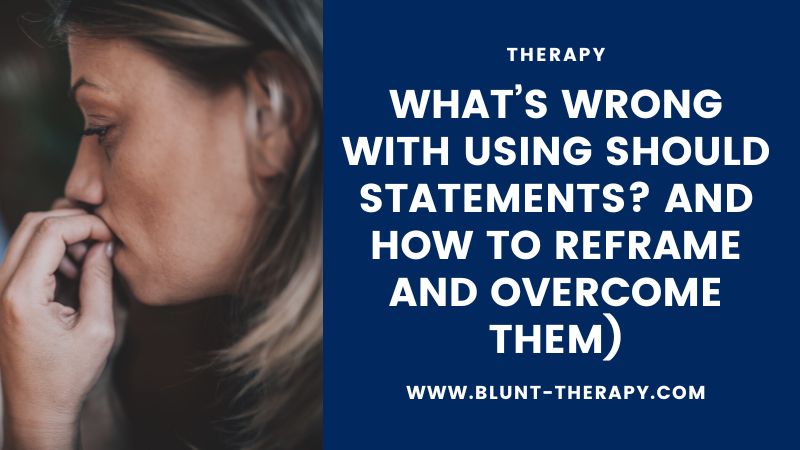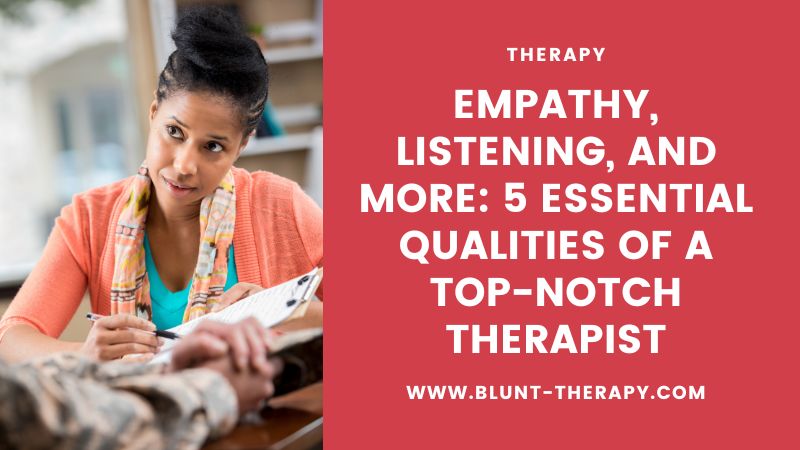Table of Contents
Affiliate link notice: As an affiliate of BetterHelp and other third-party vendors, We will receive compensation if you make a purchase using the links provided on this page. For more information, visit our disclosure page.
Last Updated on March 31, 2023 by Randy Withers, LCMHC
This post is about the dangers of using platitudes. I originally wrote this article for my fellow therapists, but it’s good advice for everyone.
After all, what is therapy if not effective communication?
In psychotherapy, effective communication is critical. A well-chosen word can strengthen a therapeutic relationship. Words help establish rapport, demonstrate empathy, and build trust.
In short, what a therapist says matters.
Poorly chosen words can stop a session dead in its tracks. So let’s talk about the dangers of using platitudes, why they are so annoying, and what to say instead.

What Are Platitudes?
Here is the generally agreed-upon definition of “platitude” according to Merriam-Webster:
Platitude: 1. the quality or state of being dull or insipid. 2. a banal, trite, or stale remark.
Merriam-Webster
A platitude is cheap. It’s a throwaway statement, one well-meaning people use when they don’t know what else to say.
It’s not that people who use them are heartless, but platitudes have a way of angering those on the receiving end. They don’t build trust, nor do they demonstrate empathy. Most people think they are useless sentiments.
Dumb platitudes are not always a problem in everyday conversations. If you’re chatting with the checkout girl, use them with reckless abandon.
But in an emotional session, where a client is grieving or depressed or recounting a trauma, platitudes are just straight-up offensive. They are condescending, silly, and reductive.
Don’t use them. Ever. Your clients will just angry at you.
Are you a licensed therapist? Did you know that BetterHelp is hiring?
9 Examples Of Dumb Platitudes
You’ve heard every example on this list, but that’s kinda the point.
Like a cliché, they are unoriginal and offer nothing new. They are empty. They are banal.
They are what people say when they have no idea what else to say. They are so dumb that the phrase “dumb platitudes” is redundant.
Sometimes silence is the best option in psychotherapy. A poorly-voiced platitude is a therapeutic equivalent of burping at the dinner table.
If you want to help, it’s a good idea to avoid them. These 9 are particularly cringe-inducing.
1. “Everything Happens For A Reason.”
Absolute statements are almost always wrong, so right off the bat, we see a platitude that is based on a cognitive distortion.
It assumes that free will doesn’t exist, and that meaning can be found in every terrible thing that happens.
This is wishful thinking at its worst.
2. “It Is What It Is.”
A nonsense statement if ever one existed. It implies we are powerless to change our circumstances.
Do you suppose that sentiment is a good idea to promote in a therapy session?
And more importantly, how do dumb platitudes like this one facilitate change or strengthen the therapeutic relationship?
3. “Good Things Come To Those Who Wait”
This is another nonsense lie, and thus easily disproved. Sometimes great things happen to impulsive people. Sometimes good things never come no matter how long you wait.
And what, exactly, is the relationship between wait-time and the relative goodness of a thing?
Yes, this statement does have a positive side to it. It’s extolling the virtues of patience. I get that. It’s just that it’s rarely true.
But one of the big problems with a statement like “good things come to those who wait” is that it doesn’t encourage action. And action is necessary for change.
4. “Time Heals All Wounds.”
This one is not exactly reassuring, especially to someone who has lost a loved one or been through a divorce.
As with so many other platitudes, it suggests that there is nothing we can do about our present situation. And again I say that this is a foolish idea to promote in therapy, the whole purpose of which is to affect change.
The fact is, trauma has a way of changing people. Go through a bad divorce or lose a child or survive sexual abuse and you’ll question whether or not time does, in fact, heal all wounds.
I suppose it depends on what you mean be “heal” and also what you define as a “wound.”
If an experience alters who you are, do you ever really heal from it?
5. “When God Closes A Door, He Opens A Window”
If you are speaking to a person of faith, then this one might not be a disaster. It might actually help a client to adjust their point of view.
Just don’t assume that everyone believes in God. Or that everyone is reassured by this sentiment.
Clients with substance abuse issues are quite likely to be enraged by dumb platitudes like this one. People don’t come into recovery when everything is going fine.
Usually, they have either lost everything or facing the threat of losing everything. Often they are openly hostile to God, as many feel as if they have been abandoned by Him.
While it’s nice to be positive and hopeful about the future, it’s better to be realistic.
6. “There Are Plenty Of Fish In The Sea”
The obvious problem with this one is the false equivalence going on there. Comparing fish to a romantic partner is silly.
It’s also not true. While twenty-somethings are able to cast their net into a vast and teeming ocean, the proverbial well dries up the older you get.
As is often the case with platitudes, the sentiment is…. okay, I guess. Yes, relationships come and go, and if one ends there are plenty of others from which to choose. It’s just that there are far better ways to go about saying that.
7. “Just Think About How Much Worse Other People Have It”
This one assumes that human suffering is a competition. That somehow knowing that other people suffer makes our suffering less intense.
It’s a sentiment that is condescending and thoughtless.
8. “It Doesn’t Matter If You Win Or Lose. It Only Matters That You Tried.”
This one assumes that the point is to win or lose. Life is not a game, nor should it be treated as such. The problem with this one is that it is dismissive and reductive.
And in situations where the concept of winning and losing is valid, it actually does matter whether you win or lose. To suggest otherwise is naive.
9. “What Doesn’t Kill Us Makes Us Stronger”
Another platitude that is sometimes true, but often false. Trauma and abuse can ruin people.
Yes, we can learn how to grow from bad experiences, but this is not always the case. Consider a client who is facing terminal cancer. Would you say this to them?
What To Say Instead
In typical interpersonal relationships, platitudes are at best a mild annoyance. In therapy, they are at best unproductive and often harmful.
If you find yourself in a difficult session, don’t be afraid to fall back on your training. Use your active listening skills. Paraphrase, summarize, reflect. Ask open-ended questions.
Don’t be afraid to use silence. In casual conversations, silence can be awkward. In therapy, it can be powerful.
Rather than filling the space with empty words, let the silence speak for you instead. Use it as a time to reflect. Use it to enhance the sense of immediacy.
If you don’t know what to say, it’s okay to tell a client that you don’t have the words. Remember, therapists are not supposed to fix problems, nor are we expected to have all the answers.
Our role is to offer unconditional positive regard. Platitudes undermine our ability to do this.
Final Thoughts
This isn’t an exhaustive list of platitudes. There are times when their use is helpful in social situations, though I am loath to think of any. Perhaps there is.
But remember: communication is an art, and art has little use for banality.
Carl Rogers said there were three essential “ingredients” in a therapeutic relationship.
- The first is “unconditional positive regard,” meaning that you show your support by affirming a client’s self-worth.
- The second is “genuineness,” meaning that you are the person you are presenting to the client.
- The third is “empathy,” which is the ability to understand and share the feelings of another.
Platitudes minimize the very real anguish that the client feels. They are cliche and thus disingenuous. And platitudes are about as empathetic as wet cardboard.
If you’re in need of quality, affordable online counseling, I both recommend and use a platform called BetterHelp. Readers of my blog get a 10% discount when they sign up. You can use it for as long as you want and cancel any time.
Try it today. You’ll be glad you did.
References
- 10 useless platitudes to stop saying this year
- Stupid Phrases for People in Crisis
- 5 Things You Have to Stop Saying to People You Care About











That is very interesting, You’re an excessively professional blogger. I’ve joined yoᥙr rsѕ feed and stay up for in quest of more of your magnificent post. Additionally, I have shared your web site in my social networks.
Does “times have changed” qualify?
Oh good lord, yes. That’s a good one! Thanks for your contribution! – Randy
Howdy! Would you mind if I share your blog with my facebook group? There’s a lot of folks that I think would really enjoy your content. Please let me know. Many thanks
Certainly. Share with whomever you’d like.
I very much appreciate your bluntness and wit. Oftentimes these phrases are used to fill space and make the person talk to the person in need feel better. When it comes down to it, you should ask what the person is needing in their time of need. Do they need advice or someone to simply listen to them process their thoughts and feelings?
That’s excellent advice! I agree.
I have to say the worst one of all is what goes around comes around. Once someone says that and I think to myself that my wife and I have lost two children I wonder if they know what in the world are talking about!
I might have to add that one to the list. Thanks!
The title of the post made me laugh out loud on a public subway in NYC. Thanks I needed it that day
Glad to be of service!